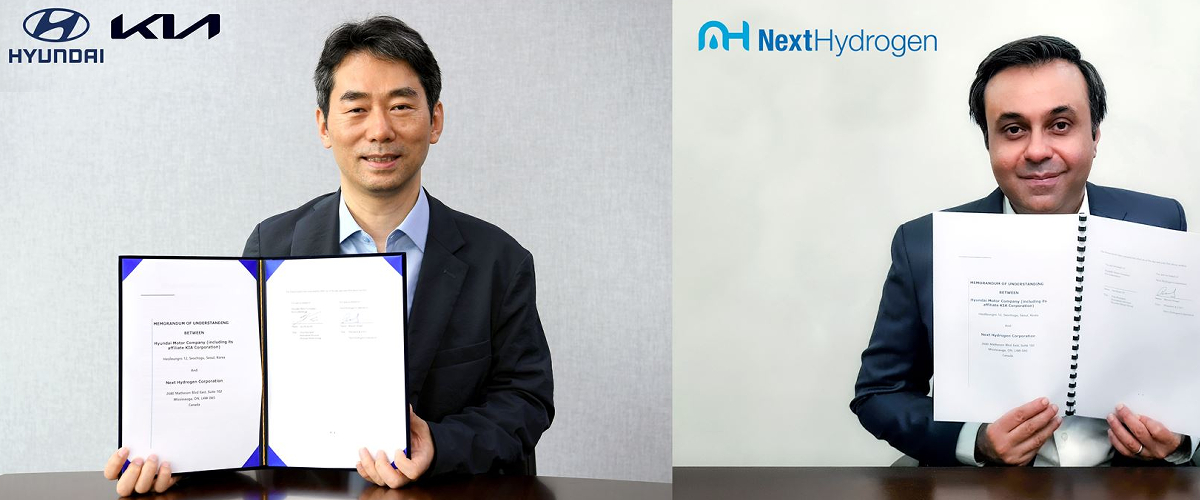
 Your Credit Estimate
Your Credit Estimate
 Your Credit
Your Credit
Your zip code helps us provide you with the most accurate vehicle pricing and vehicle availability.
We estimate your credit score to give you an idea of your monthly payments. To get an accurate payment amount, complete our credit application by clicking the Start Credit Application button below.
start credit application
For years, hydrogen fuel cells have slowly but surely driven on into the spotlight for the next possible fuel source for the automotive industry. Years ago, the Hyundai Motor Group and then-Kia Motors discussed the possibility of introducing hydrogen fuel cell vehicles, or vehicles powered by hydrogen, into their lineups of models. Earlier this year, it was even thought that hydrogen fuel cell vehicles were starting to challenge electric vehicles (EVs), and with the global semiconductor chip shortage, EVs may become more difficult to produce. That may be why the Kia Corporation and Hyundai Motor Company have signed a new contract with Next Hydrogen Corporation, a Canadian company specializing in water electrolysis technology.
Electrolysis is the process of separating the hydrogen atoms from oxygen atoms in water. As anyone who took basic chemistry knows, water also known as H2O – two hydrogen atoms plus one oxygen atom equal one molecule of water. It’s not much, but when you have a couple of liters of water, that’s a lot of fuel just waiting to be used. Once the hydrogen is separated from the oxygen, there will no longer be any water, just two separate gases – oxygen is already an energy source used in internal gas combustion engines, and with hydrogen added to the mix, there is no need for gasoline – it’s all clean energy.
That’s the goal, anyways. Under the new agreement between Kia, Hyundai, and Next Hydrogen, the three companies will jointly develop an alkaline water electrolysis system that makes it easier to generate green hydrogen economically. Although the above example sounds simple, producing clean (or green) hydrogen is an expensive and time consuming process. When it comes to an alkaline water electrolysis system, it can be very cost-effective – this hydrogen production method electrolyzes water using lye, the same stuff used to make bar soap, and I haven’t heard of any soap or shampoo companies going out of business due to short supply – if anything, they made the big bucks last year.
The finished product of Kia, Hyundai, and Next Hydrogen is called what’s known in the industry as an Electrolyzer Stack. There are many different kinds, ranging from stacks that use CO2 (carbon dioxide), another gas, to stacks that perform electrolysis with solid objects. Aiming to develop a new stack, the three companies will combine Kia and Hyundai Motor’s component technology related to electrodes, bipolar plates and current collectors with Next Hydrogen’s design technology. If all goes well, they’ll have a new stack that can produce green hydrogen more economically and at much higher rates.
“We are pleased to partner with Next Hydrogen specializing in state-of-the-art water electrolysis technology. This partnership is another leap forward for our hydrogen business and will be our first step into the alkaline water electrolysis market…We believe our technology will be an excellent match for Next Hydrogen's technology, and this synergy will help achieve our goal to provide our customers with cost-effective green hydrogen.” - Jae-Hyuk Oh, Vice President and Head of Energy Business Development Group at Hyundai Motor Group
This is all in the name of HTWO, a new brand revealed by the Hyundai Motor Group that will represent the Group’s world-leading hydrogen fuel cell system. The new agreement between Kia, Hyundai, and Next Hydrogen will help HTWO with its first objective - develop a next-generation hydrogen fuel cell system that can be applied to various forms of mobility. Hydrogen fuel cell vehicles may be the first to hit the streets, but the Uber Airbus and urban air mobility (UAM) is surely next on the list.
What will these automakers do next to change the auto industry? Stay up with all the cool automotive tech news when you follow Nowcar on social media.